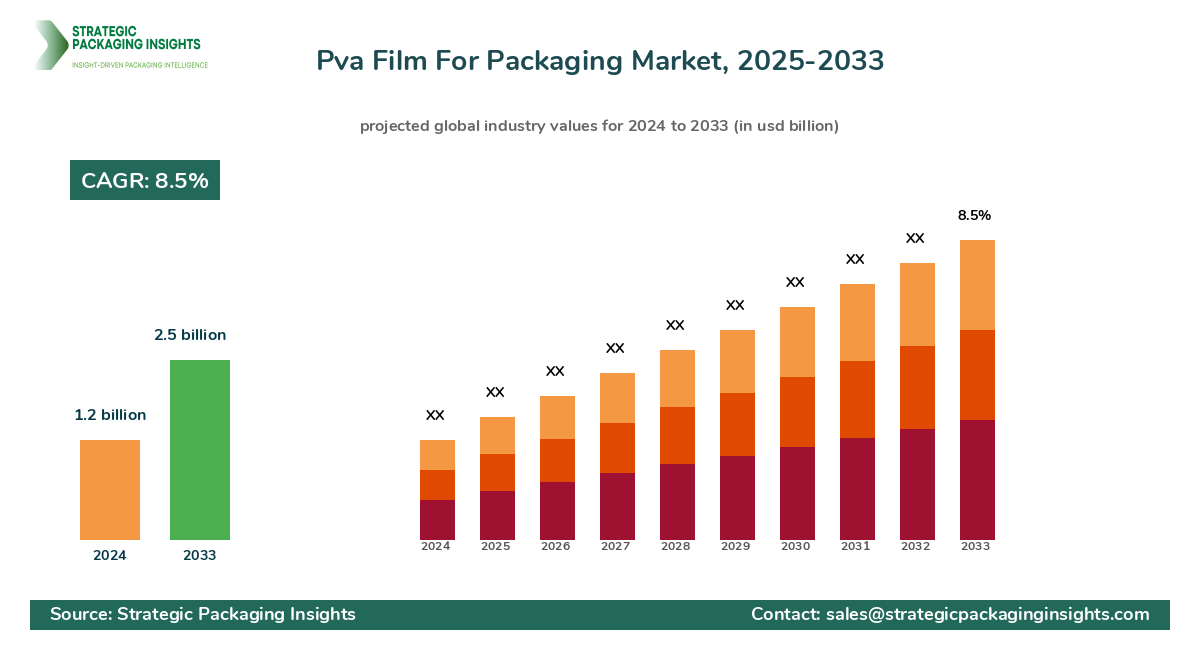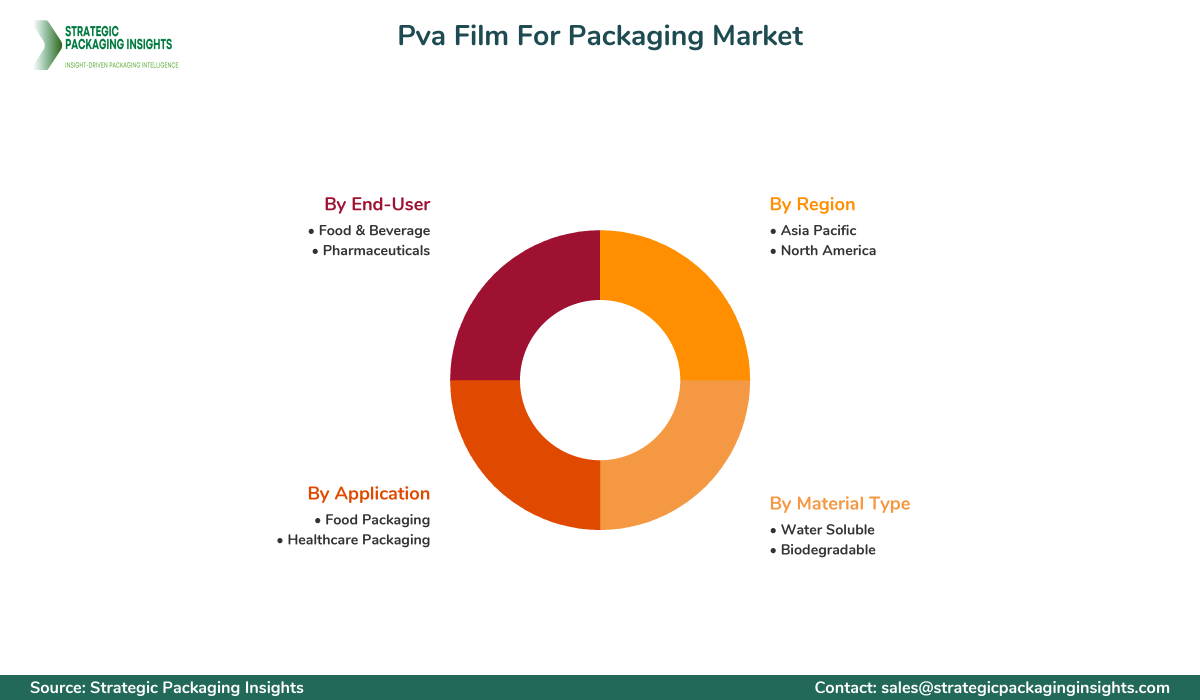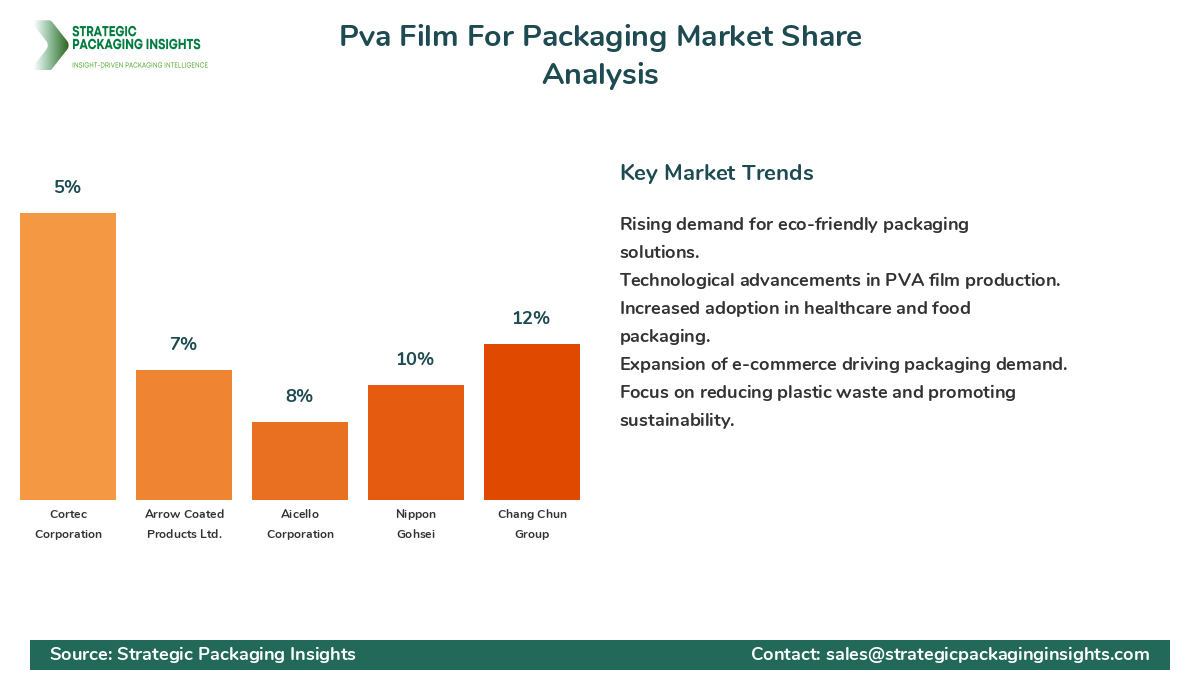- Home
- Eco-Friendly Packaging
- Pva Film For Packaging Market Size, Future Growth and Forecast 2033
Pva Film For Packaging Market Size, Future Growth and Forecast 2033
Pva Film For Packaging Market Segments - by Material Type (Water Soluble, Biodegradable), Application (Food Packaging, Healthcare Packaging, Industrial Packaging, Consumer Goods Packaging), End-User (Food & Beverage, Pharmaceuticals, Agriculture, Consumer Goods), and Region (Asia Pacific, North America, Latin America, Europe, and Middle East & Africa) - Market Dynamics, Growth Opportunities, Strategic Drivers, and PESTLE Outlook (2025–2033)
Pva Film For Packaging Market Outlook
The PVA film for packaging market was valued at $1.2 billion in 2024 and is projected to reach $2.5 billion by 2033, growing at a CAGR of 8.5% during the forecast period 2025–2033. This market is driven by the increasing demand for sustainable and eco-friendly packaging solutions. PVA films, known for their water solubility and biodegradability, are gaining traction across various industries, including food packaging, healthcare, and consumer goods. The rising awareness about environmental conservation and stringent regulations against plastic usage are further propelling the market growth. Additionally, advancements in PVA film technology, such as enhanced barrier properties and improved mechanical strength, are expected to open new avenues for market expansion.
Report Scope
| Attributes | Details |
| Report Title | Pva Film For Packaging Market Size, Future Growth and Forecast 2033 |
| Base Year | 2024 |
| Historic Data | 2017-2023 |
| Forecast Period | 2025-2033 |
| Number of Pages | 237 |
| Material Type | Water Soluble, Biodegradable |
| Application | Food Packaging, Healthcare Packaging |
| End-User | Food & Beverage, Pharmaceuticals |
| Region | Asia Pacific, North America |
| Customization Available | Yes* |
Opportunities & Threats
The PVA film for packaging market presents significant opportunities, primarily driven by the growing consumer preference for sustainable packaging solutions. As environmental concerns continue to rise, industries are increasingly adopting biodegradable materials to reduce their carbon footprint. PVA films, being water-soluble and eco-friendly, are well-positioned to capitalize on this trend. Moreover, the increasing demand for single-use packaging in the food and beverage industry, coupled with the rising popularity of ready-to-eat meals, is expected to boost the demand for PVA films. The healthcare sector also offers lucrative opportunities, as PVA films are used in packaging medical devices and pharmaceuticals, ensuring product safety and integrity.
Another opportunity lies in the technological advancements in PVA film production. Manufacturers are investing in research and development to enhance the properties of PVA films, such as improving their barrier properties against oxygen and moisture. This innovation is crucial for expanding the application scope of PVA films in various industries. Additionally, the growing trend of e-commerce and online retailing is driving the demand for efficient and sustainable packaging solutions, further fueling the growth of the PVA film market. The increasing focus on reducing plastic waste and promoting circular economy practices is expected to create a favorable environment for the adoption of PVA films.
Despite the promising opportunities, the PVA film for packaging market faces certain challenges. One of the primary restrainers is the high cost of PVA films compared to conventional plastic films. The production process of PVA films involves complex techniques and expensive raw materials, which contribute to their higher price. This cost factor may hinder the widespread adoption of PVA films, especially in price-sensitive markets. Additionally, the limited availability of raw materials and the dependency on specific suppliers pose a challenge to the market growth. Furthermore, the lack of awareness and understanding of PVA films among consumers and industries may impede their acceptance and usage.
The PVA film for packaging market is characterized by a competitive landscape with several key players striving to gain a significant market share. The market is dominated by a few major companies, while numerous small and medium-sized enterprises also contribute to the market dynamics. The competitive rivalry is intense, with companies focusing on product innovation, strategic partnerships, and mergers and acquisitions to strengthen their market position. The presence of established players with extensive distribution networks and strong brand recognition poses a challenge for new entrants. However, the growing demand for sustainable packaging solutions provides ample opportunities for companies to expand their market presence.
Kuraray Co., Ltd. holds a prominent position in the PVA film for packaging market, with a substantial market share. The company is known for its innovative product offerings and strong focus on research and development. Kuraray's extensive product portfolio and global presence enable it to cater to a wide range of industries, including food packaging, healthcare, and consumer goods. The company's commitment to sustainability and environmental responsibility further enhances its market reputation.
Another key player in the market is Sekisui Chemical Co., Ltd., which has a significant market share. Sekisui Chemical is renowned for its advanced PVA film technologies and high-quality products. The company's strong emphasis on customer satisfaction and continuous improvement has helped it establish a loyal customer base. Sekisui Chemical's strategic collaborations and partnerships with other industry players have further strengthened its market position.
Chang Chun Group is also a major player in the PVA film for packaging market, known for its diverse product offerings and extensive distribution network. The company's focus on innovation and product development has enabled it to meet the evolving demands of various industries. Chang Chun Group's commitment to quality and customer-centric approach has contributed to its success in the market. The company's strong presence in the Asia Pacific region, coupled with its expanding global footprint, positions it as a key player in the PVA film market.
Key Highlights Pva Film For Packaging Market

- Increasing demand for sustainable and eco-friendly packaging solutions.
- Technological advancements in PVA film production enhancing barrier properties.
- Growing popularity of single-use packaging in the food and beverage industry.
- Rising adoption of PVA films in the healthcare sector for medical device packaging.
- Expansion of e-commerce and online retailing driving demand for efficient packaging.
- High cost of PVA films compared to conventional plastic films as a market challenge.
- Limited availability of raw materials and dependency on specific suppliers.
- Intense competitive rivalry among key players in the market.
- Strategic partnerships and mergers and acquisitions shaping the market dynamics.
- Focus on reducing plastic waste and promoting circular economy practices.
Top Countries Insights in Pva Film For Packaging
In the United States, the PVA film for packaging market is witnessing significant growth, driven by the increasing demand for sustainable packaging solutions. The market size in the US is projected to reach $500 million by 2033, with a CAGR of 7%. The stringent regulations against plastic usage and the growing awareness about environmental conservation are key growth drivers. Additionally, the presence of major market players and the adoption of advanced packaging technologies contribute to the market expansion.
China is another prominent market for PVA films, with a projected market size of $600 million by 2033 and a CAGR of 10%. The rapid industrialization and urbanization in China have led to increased demand for packaging materials, including PVA films. The government's initiatives to promote sustainable practices and reduce plastic waste further boost the market growth. Moreover, the presence of a large consumer base and the expansion of the e-commerce sector drive the demand for efficient packaging solutions.
In Germany, the PVA film for packaging market is expected to reach $300 million by 2033, with a CAGR of 6%. The country's strong focus on environmental sustainability and stringent regulations against plastic usage are key factors driving the market growth. Germany's well-established packaging industry and the presence of leading market players contribute to the market's expansion. Additionally, the increasing demand for biodegradable packaging materials in the food and beverage sector supports the market growth.
Japan is witnessing steady growth in the PVA film for packaging market, with a projected market size of $200 million by 2033 and a CAGR of 5%. The country's emphasis on technological advancements and innovation in packaging materials drives the market growth. Japan's strong manufacturing sector and the presence of key market players contribute to the market's expansion. Moreover, the growing demand for sustainable packaging solutions in the healthcare and consumer goods sectors supports the market growth.
In India, the PVA film for packaging market is expected to reach $150 million by 2033, with a CAGR of 8%. The country's rapidly growing population and increasing consumer awareness about sustainable packaging solutions drive the market growth. The government's initiatives to promote eco-friendly practices and reduce plastic waste further boost the market expansion. Additionally, the expanding food and beverage industry and the rise of e-commerce contribute to the demand for PVA films.
Value Chain Profitability Analysis
The value chain profitability analysis for the PVA film for packaging market reveals a complex ecosystem involving various stakeholders, including raw material suppliers, manufacturers, distributors, and end-users. The profit margins and revenue distribution across these stakeholders vary significantly, influenced by factors such as production costs, pricing models, and market demand. Raw material suppliers play a crucial role in the value chain, providing essential inputs for PVA film production. The cost of raw materials significantly impacts the overall profitability of the value chain, with fluctuations in raw material prices affecting the profit margins of manufacturers.
Manufacturers are at the core of the value chain, responsible for producing PVA films and ensuring their quality and performance. The production process involves advanced technologies and specialized equipment, contributing to the overall cost structure. Manufacturers adopt various pricing models, including cost-plus pricing and value-based pricing, to determine the final product price. The profit margins for manufacturers depend on factors such as production efficiency, economies of scale, and market competition. Distributors and wholesalers play a vital role in the value chain, facilitating the distribution and availability of PVA films to end-users. Their profit margins are influenced by factors such as distribution costs, market demand, and competitive pricing strategies.
End-users, including industries such as food and beverage, healthcare, and consumer goods, are the final stakeholders in the value chain. The profitability for end-users depends on the cost-effectiveness and performance of PVA films in their specific applications. The adoption of PVA films by end-users is driven by factors such as environmental sustainability, regulatory compliance, and consumer preferences. The value chain profitability analysis highlights the importance of collaboration and partnerships among stakeholders to optimize the value chain and enhance overall profitability. Digital transformation and technological advancements are reshaping the value chain, enabling stakeholders to streamline operations, reduce costs, and capture new revenue opportunities.
Evolving Market Dynamics (2018–2024) and Strategic Foresight (2025–2033)
The PVA film for packaging market has witnessed significant shifts in market dynamics between the periods 2018–2024 and 2025–2033. During the historical period, the market experienced steady growth, driven by increasing environmental awareness and the demand for sustainable packaging solutions. The market size evolved from $800 million in 2018 to $1.2 billion in 2024, with a CAGR of 7%. The segment distribution shifted towards biodegradable and water-soluble films, reflecting the growing preference for eco-friendly materials. The regional contribution also changed, with Asia Pacific emerging as a dominant market due to rapid industrialization and urbanization.
In the forecast period 2025–2033, the market is expected to witness accelerated growth, with a projected CAGR of 8.5%. The market size is anticipated to reach $2.5 billion by 2033, driven by technological advancements and the increasing adoption of PVA films in various industries. The segment distribution is expected to further shift towards Biodegradable Films, driven by stringent regulations against plastic usage and the growing demand for sustainable packaging solutions. The regional contribution is likely to see significant changes, with North America and Europe gaining prominence due to their strong focus on environmental sustainability and regulatory compliance.
Technological impact factors, such as advancements in PVA film production techniques and the development of innovative packaging solutions, are expected to drive market growth in the forecast period. The client demand transformations are anticipated to focus on customized and high-performance packaging solutions, catering to specific industry requirements. The strategic imperatives for market players include investing in research and development, expanding product portfolios, and strengthening distribution networks to capture emerging opportunities and gain a competitive edge in the evolving market landscape.
Pva Film For Packaging Market Segments Insights

Material Type Analysis
The PVA film for packaging market is segmented based on material type into water-soluble and biodegradable films. Water-soluble PVA films are gaining popularity due to their unique properties, such as dissolvability in water and environmental friendliness. These films are widely used in applications where easy disposal and reduced environmental impact are crucial, such as in single-use packaging and agricultural applications. The demand for water-soluble films is driven by the increasing awareness about environmental conservation and the need for sustainable packaging solutions. Manufacturers are focusing on enhancing the performance of water-soluble films by improving their barrier properties and mechanical strength, thereby expanding their application scope.
Biodegradable PVA films are also witnessing significant demand, driven by the growing emphasis on reducing plastic waste and promoting circular economy practices. These films offer excellent biodegradability, making them suitable for various applications, including food packaging, healthcare, and consumer goods. The demand for biodegradable films is further fueled by stringent regulations against plastic usage and the increasing consumer preference for eco-friendly products. Manufacturers are investing in research and development to enhance the properties of biodegradable films, such as improving their shelf life and resistance to external factors. The competition in the biodegradable film segment is intense, with companies focusing on product innovation and strategic partnerships to gain a competitive edge.
Application Analysis
The application segment of the PVA film for packaging market includes food packaging, Healthcare Packaging, industrial packaging, and consumer goods packaging. The food packaging segment holds a significant share in the market, driven by the increasing demand for sustainable and safe packaging solutions. PVA films are widely used in food packaging applications due to their excellent barrier properties, biodegradability, and ability to preserve the freshness and quality of food products. The growing popularity of ready-to-eat meals and single-use packaging further boosts the demand for PVA films in the food packaging sector. Manufacturers are focusing on developing innovative packaging solutions to meet the evolving demands of the food industry.
The healthcare packaging segment is also witnessing substantial growth, driven by the increasing demand for safe and reliable packaging solutions for medical devices and pharmaceuticals. PVA films offer excellent protection against moisture, oxygen, and contaminants, ensuring the integrity and safety of healthcare products. The rising focus on patient safety and regulatory compliance further drives the demand for PVA films in the healthcare sector. Manufacturers are investing in research and development to enhance the properties of PVA films, such as improving their sterilization capabilities and compatibility with various medical applications. The competition in the healthcare packaging segment is intense, with companies focusing on product innovation and strategic collaborations to gain a competitive advantage.
End-User Analysis
The end-user segment of the PVA film for packaging market includes food and beverage, pharmaceuticals, agriculture, and consumer goods industries. The food and beverage industry is a major end-user of PVA films, driven by the increasing demand for sustainable and eco-friendly packaging solutions. PVA films are widely used in food and beverage packaging applications due to their excellent barrier properties, biodegradability, and ability to preserve the freshness and quality of food products. The growing popularity of ready-to-eat meals and single-use packaging further boosts the demand for PVA films in the food and beverage sector. Manufacturers are focusing on developing innovative packaging solutions to meet the evolving demands of the food and beverage industry.
The pharmaceuticals industry is also a significant end-user of PVA films, driven by the increasing demand for safe and reliable packaging solutions for medical devices and pharmaceuticals. PVA films offer excellent protection against moisture, oxygen, and contaminants, ensuring the integrity and safety of pharmaceutical products. The rising focus on patient safety and regulatory compliance further drives the demand for PVA films in the pharmaceuticals sector. Manufacturers are investing in research and development to enhance the properties of PVA films, such as improving their sterilization capabilities and compatibility with various pharmaceutical applications. The competition in the pharmaceuticals segment is intense, with companies focusing on product innovation and strategic collaborations to gain a competitive advantage.
Region Analysis
The PVA film for packaging market is segmented into regions, including Asia Pacific, North America, Latin America, Europe, and Middle East & Africa. Asia Pacific holds a significant share in the market, driven by rapid industrialization, urbanization, and the increasing demand for sustainable packaging solutions. The presence of major market players and the expansion of the e-commerce sector further contribute to the market growth in the region. The demand for PVA films in Asia Pacific is expected to continue growing, driven by the increasing awareness about environmental conservation and the need for eco-friendly packaging solutions.
North America and Europe are also prominent markets for PVA films, driven by the strong focus on environmental sustainability and regulatory compliance. The stringent regulations against plastic usage and the growing consumer preference for sustainable packaging solutions drive the demand for PVA films in these regions. The presence of well-established packaging industries and the adoption of advanced packaging technologies further contribute to the market growth. The demand for PVA films in North America and Europe is expected to continue growing, driven by the increasing focus on reducing plastic waste and promoting circular economy practices.
Pva Film For Packaging Market Segments
The Pva Film For Packaging market has been segmented on the basis of
Material Type
- Water Soluble
- Biodegradable
Application
- Food Packaging
- Healthcare Packaging
End-User
- Food & Beverage
- Pharmaceuticals
Region
- Asia Pacific
- North America
Primary Interview Insights
What are the key drivers for the PVA film for packaging market?
What challenges does the PVA film market face?
How is the competitive landscape shaping up in the PVA film market?
What opportunities exist for new entrants in the PVA film market?
How is digital transformation impacting the PVA film market?
Latest Reports

The Cold Seal Packaging market was valued at $1.5 billion in 2024 and is projected to reach $2.3 billion by 2033, growing at a CAGR of 4.8% during the forecast period 2025–2033.

The Transparent Barrier Packaging Films market was valued at $12.5 billion in 2024 and is projected to reach $20.3 billion by 2033, growing at a CAGR of 5.8% during the forecast period 2025–2033.

The Flatback Tape market was valued at $2.5 billion in 2024 and is projected to reach $4.1 billion by 2033, growing at a CAGR of 5.8% during the forecast period 2025–2033.

The packer bottle market was valued at $3.5 billion in 2024 and is projected to reach $5.8 billion by 2033, growing at a CAGR of 5.2% during the forecast period 2025–2033.

The Canada Nano-Enabled Packaging Food Beverages market was valued at $1.2 billion in 2024 and is projected to reach $3.5 billion by 2033, growing at a CAGR of 12.5% during the forecast period 2025–2033.

The India Aluminum Beverage Can market was valued at $1.2 billion in 2024 and is projected to reach $2.5 billion by 2033, growing at a CAGR of 8.5% during the forecast period 2025–2033.

The fast-food reusable packaging market was valued at $1.2 billion in 2024 and is projected to reach $3.5 billion by 2033, growing at a CAGR of 12.5% during the forecast period 2025–2033.

The pallets market was valued at $59.91 billion in 2024 and is projected to reach $88.69 billion by 2033, growing at a CAGR of 4.5% during the forecast period 2025–2033.

The lamination adhesives market was valued at $2.5 billion in 2024 and is projected to reach $4.1 billion by 2033, growing at a CAGR of 5.8% during the forecast period 2025–2033.

The garment packing machine market was valued at $1.2 billion in 2024 and is projected to reach $2.5 billion by 2033, growing at a CAGR of 8.5% during the forecast period 2025–2033.

The shrink bags market was valued at $3.5 billion in 2024 and is projected to reach $5.8 billion by 2033, growing at a CAGR of 5.2% during the forecast period 2025–2033.

The beverage packaging market was valued at $128 billion in 2024 and is projected to reach $186 billion by 2033, growing at a CAGR of 4.2% during the forecast period 2025–2033.

The North America Freight and Logistics market was valued at $1,200 billion in 2024 and is projected to reach $1,800 billion by 2033, growing at a CAGR of 4.5% during the forecast period 2025–2033.

The Anti-Counterfeiting Packaging market was valued at $105 billion in 2024 and is projected to reach $182 billion by 2033, growing at a CAGR of 6.5% during the forecast period 2025–2033.

The Active and Modified Atmospheric Packaging market was valued at $15.2 billion in 2024 and is projected to reach $25.8 billion by 2033, growing at a CAGR of 6.5% during the forecast period 2025–2033.

The molded fiber packaging market was valued at $7.5 billion in 2024 and is projected to reach $12.3 billion by 2033, growing at a CAGR of 5.8% during the forecast period 2025–2033.

The micro packaging market was valued at $1.2 billion in 2024 and is projected to reach $2.5 billion by 2033, growing at a CAGR of 8.5% during the forecast period 2025–2033.

The Anti-counterfeit Pharmaceuticals Packaging market was valued at $80 billion in 2024 and is projected to reach $150 billion by 2033, growing at a CAGR of 7.5% during the forecast period 2025–2033.

The MDO-PE Film market was valued at $3.5 billion in 2024 and is projected to reach $5.8 billion by 2033, growing at a CAGR of 5.2% during the forecast period 2025–2033.

The compostable pouch market was valued at $1.2 billion in 2024 and is projected to reach $3.5 billion by 2033, growing at a CAGR of 12.5% during the forecast period 2025–2033.

The Smart Packaging market was valued at $23.5 billion in 2024 and is projected to reach $43.5 billion by 2033, growing at a CAGR of 7.2% during the forecast period 2025–2033.

The pharmaceutical glass packaging market was valued at $14.5 billion in 2024 and is projected to reach $22.3 billion by 2033, growing at a CAGR of 4.9% during the forecast period 2025–2033.

The tray liners market was valued at $1.2 billion in 2024 and is projected to reach $2.3 billion by 2033, growing at a CAGR of 6.5% during the forecast period 2025–2033.

The Fan-Out Wafer Level Packaging (FOWLP) market was valued at $1.5 billion in 2024 and is projected to reach $4.2 billion by 2033, growing at a CAGR of 12.5% during the forecast period 2025–2033.

The cartoning machines market was valued at $3.5 billion in 2024 and is projected to reach $5.2 billion by 2033, growing at a CAGR of 4.5% during the forecast period 2025–2033.

The Cold Seal Packaging market was valued at $1.5 billion in 2024 and is projected to reach $2.3 billion by 2033, growing at a CAGR of 4.8% during the forecast period 2025–2033.

The Transparent Barrier Packaging Films market was valued at $12.5 billion in 2024 and is projected to reach $20.3 billion by 2033, growing at a CAGR of 5.8% during the forecast period 2025–2033.

The Flatback Tape market was valued at $2.5 billion in 2024 and is projected to reach $4.1 billion by 2033, growing at a CAGR of 5.8% during the forecast period 2025–2033.

The packer bottle market was valued at $3.5 billion in 2024 and is projected to reach $5.8 billion by 2033, growing at a CAGR of 5.2% during the forecast period 2025–2033.

The Canada Nano-Enabled Packaging Food Beverages market was valued at $1.2 billion in 2024 and is projected to reach $3.5 billion by 2033, growing at a CAGR of 12.5% during the forecast period 2025–2033.

The India Aluminum Beverage Can market was valued at $1.2 billion in 2024 and is projected to reach $2.5 billion by 2033, growing at a CAGR of 8.5% during the forecast period 2025–2033.

The fast-food reusable packaging market was valued at $1.2 billion in 2024 and is projected to reach $3.5 billion by 2033, growing at a CAGR of 12.5% during the forecast period 2025–2033.

The pallets market was valued at $59.91 billion in 2024 and is projected to reach $88.69 billion by 2033, growing at a CAGR of 4.5% during the forecast period 2025–2033.

The lamination adhesives market was valued at $2.5 billion in 2024 and is projected to reach $4.1 billion by 2033, growing at a CAGR of 5.8% during the forecast period 2025–2033.

The garment packing machine market was valued at $1.2 billion in 2024 and is projected to reach $2.5 billion by 2033, growing at a CAGR of 8.5% during the forecast period 2025–2033.

The shrink bags market was valued at $3.5 billion in 2024 and is projected to reach $5.8 billion by 2033, growing at a CAGR of 5.2% during the forecast period 2025–2033.

The beverage packaging market was valued at $128 billion in 2024 and is projected to reach $186 billion by 2033, growing at a CAGR of 4.2% during the forecast period 2025–2033.

The North America Freight and Logistics market was valued at $1,200 billion in 2024 and is projected to reach $1,800 billion by 2033, growing at a CAGR of 4.5% during the forecast period 2025–2033.

The Anti-Counterfeiting Packaging market was valued at $105 billion in 2024 and is projected to reach $182 billion by 2033, growing at a CAGR of 6.5% during the forecast period 2025–2033.

The Active and Modified Atmospheric Packaging market was valued at $15.2 billion in 2024 and is projected to reach $25.8 billion by 2033, growing at a CAGR of 6.5% during the forecast period 2025–2033.

The molded fiber packaging market was valued at $7.5 billion in 2024 and is projected to reach $12.3 billion by 2033, growing at a CAGR of 5.8% during the forecast period 2025–2033.

The micro packaging market was valued at $1.2 billion in 2024 and is projected to reach $2.5 billion by 2033, growing at a CAGR of 8.5% during the forecast period 2025–2033.

The Anti-counterfeit Pharmaceuticals Packaging market was valued at $80 billion in 2024 and is projected to reach $150 billion by 2033, growing at a CAGR of 7.5% during the forecast period 2025–2033.

The MDO-PE Film market was valued at $3.5 billion in 2024 and is projected to reach $5.8 billion by 2033, growing at a CAGR of 5.2% during the forecast period 2025–2033.

The compostable pouch market was valued at $1.2 billion in 2024 and is projected to reach $3.5 billion by 2033, growing at a CAGR of 12.5% during the forecast period 2025–2033.

The Smart Packaging market was valued at $23.5 billion in 2024 and is projected to reach $43.5 billion by 2033, growing at a CAGR of 7.2% during the forecast period 2025–2033.

The pharmaceutical glass packaging market was valued at $14.5 billion in 2024 and is projected to reach $22.3 billion by 2033, growing at a CAGR of 4.9% during the forecast period 2025–2033.

The tray liners market was valued at $1.2 billion in 2024 and is projected to reach $2.3 billion by 2033, growing at a CAGR of 6.5% during the forecast period 2025–2033.

The Fan-Out Wafer Level Packaging (FOWLP) market was valued at $1.5 billion in 2024 and is projected to reach $4.2 billion by 2033, growing at a CAGR of 12.5% during the forecast period 2025–2033.

The cartoning machines market was valued at $3.5 billion in 2024 and is projected to reach $5.2 billion by 2033, growing at a CAGR of 4.5% during the forecast period 2025–2033.
